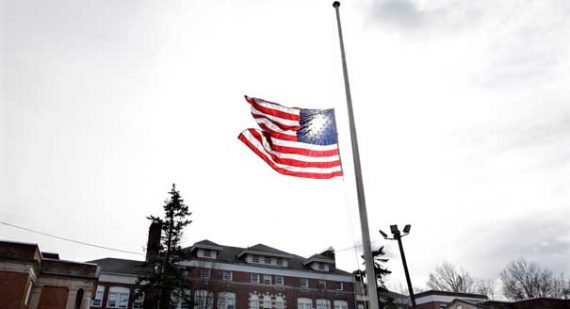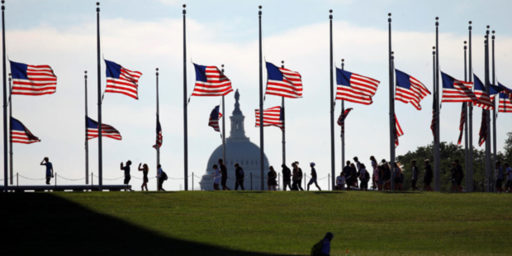Whitney Houston, Chris Christie, And America’s Obsession With Celebrity Worship
An object lesson in celebrity worship from the State of New Jersey.
New Jersey Governor Chris Christie is taking political heat over his decision to lower state flags to half-staff to mark the death of Whitney Houston, whose funeral is taking place today in the state where she grew up:
Fending off fierce criticism for planning to lower flags at state buildings the day of Whitney Houston’s funeral, New Jersey Gov. Chris Christie said the late singer is not a role model but has earned the honor as a cultural icon.
Christie on Wednesday said he’s disturbed people are disparaging Houston’s accomplishments because of her troubles with substance abuse.
“This is a disease that some people struggle with and conquer on a day-to-day basis, and some people succumb to it. And I don’t believe that that should diminish the other contributions they’ve made in their life,” Christie said.
“I’m not saying that Whitney Houston is a role model. She’s not a role model in that respect, in every aspect of her life. But what she is is a cultural icon in the history of this state,” he said. “I’m disturbed by people who believe … because of her history of substance abuse, that somehow she’s forfeited the good things that she did in her life. I just reject that on a human level.”
(…)
Between Christie’s national profile and the proliferation of social media, the decision sparked a strong response, mostly negative, in the state and beyond its borders.
“Why is NJ lowering our American Flag to honor Whitney Houston? Are they all mad???” a retired Marine from Southampton wrote on Twitter.
“Shame on you for ordering our flag to be flown half-mass for a singer who od’d!” wrote the wife of an Army sniper. “… Our flag is to be used to honor true American heroes, the ones you just disrespected.”
“Really flags will be lowered for a druggie, Whitney Houston,” East Brunswick resident Colleen Collins tweeted. “Governor is wrong to allow this, soldiers die and no one pays attention.”
Christie has ordered the flags lowered at state buildings 30 times for servicemen killed in action, including once for a Army soldier killed in Korea in 1951 whose remains were identified and returned last year.
Christie has also ordered flags lowered for six New Jersey political figures, three law-enforcement officers killed on duty, two anniversaries of the 9/11 terrorist attacks, E Street Band saxophone player Clarence Clemons and the all-time winningest high-school baseball coach in New Jersey history.
This is hardly the most important issue on the planet, of course, (and it’s hardly the most disappointing thing Christie has done this week) but it is just one example of the odd way that Americans treat celebrity. Why is it that the death of a woman that most people never met seems to be more important to some people than if one of their neighbors, or indeed a member of their own family? What exactly is it about Whitney Houston that makes her funeral an event so newsworthy that all three cable “news” networks will be covering it live today? Perhaps I’m the odd person out here — after all, I was largely sickened by the way people over-reacted to the death of Diana Spencer in 1997, at least here in the United States — but I honestly don’t get why people let themselves get so wrapped up in what they think the lives of the singers, actors, or musicians they admire must be that we see reactions like this. Yes, it’s sad that Whitney Houston is dead, as it’s sad when anyone dies, but a Breaking News event complete with live funeral coverage and commentary? I simply cannot justify it.
As for Christie’s decision to fly flags at half-staff, fellow New Jersey native Jonathan Capehart doesn’t see anything wrong with it:
Three cheers for Gov. Chris Christie (R-N.J.) for not only ordering the flags to be flown at half-staff on Saturday to honor the late Whitney Houston, but also for vigorously defending his controversial decision. I’m not saying this because I’m a proud son of New Jersey, who, like Houston, was born in Newark — albeit four years later. Houston deserves this special recognition.
Yes, ok, fine. The chanteuse’s rocky personal life made her a questionable role model. And her destructive choices put a blemish the size of a Garden State tomato on Christie’s honor. Still, the governor did the right thing. For the one thread that ties all of the tributes to the Jersey Girl’s career together is the awe over her extraordinary voice. When Houston sang, you paid attention.
So now the standard for when someone deserves to be honored comes down to whether or not they are a good singer? Does this mean that flags will be lowered in the Garden State when Jon Bon Jovi and Bruce Springsteen die as well? And how does Christie’s decision this year compare to 1998, when then-Governor Christine Todd Whitman declined to lower state flags to mark the death of Frank Sinatra, one of the state’s most famous sons? And no, I don’t think that it would have been appropriate to lower flags for Sinatra.
Tommy Christopher, another New Jersey native, seems to think that most of the opposition to Christie’s move comes from people citing Houston’s history of substance abuse and the fact that her death appears to be related to drug and alcohol abuse. While that may be the case for some of the more vocal critics of the decision, it’s not the only reason to criticize what Christie did and in that regard, I think Jazz Shaw put it best:
Lowering the flags for her? She was a singer. As the WCHS report notes, after researching previous executive orders, the flags were not lowered for Frank Sinatra. In fact, the first “celebrity” person (as opposed to military or elected leaders) for whom the flags were lowered was Clarence Clemons, and that was done by Christie also. (For the record, I’m a HUGE fan of The Boss and the Big Man, but never heard that he had lowered the flags for Clemons, which I would have objected to as well.)
Lowering the flags for national disasters, etc. is fine. But for this? Whitney Houston was a wealthy woman who achieved fantastic success in the field of opportunity which is America. She was a great singer. She died in a tragic fashion as far too many Americans do. But this is not a national tragedy.
No, it isn’t. It’s not even a tragedy for the State of New Jersey. It has nothing to do with the personal problems that Houston struggled with throughout her life or the fact that her death may have been caused by improper use of drugs and alcohol. The problem with Christie’s decision isn’t how Houston lived or died, it’s the fact that this is an honor best left to heroes, not mere celebrities. Unfortunately our culture seems to have a problem telling the difference between the two anymore.







I still think this is the result of 24/7 cable tabloid news. Pre cable the only thing I can remember being anything like it is when Kennedy was assassinated.
@Ron Beasley: This is my view as well. Houston’s death presents cheap and easy coverage for the cable channels. It is a clear illustration that most “news” is really “infotainment.”
They flew the flags at half staff in CA when Wayne died and across the nation when Nixon died. We’re these heroes or crooks? The distinction between crooks, heroes and celebrities is somewhat blurred in the American mind. As to the wider American obsession with celebrity it’s simply a cultural fact like our narcissism, gullibility and hypocrisy.
Well on the one hand of course the media and culture in general plays into this. How many TV shows and blogs exist purely for the purpose of watching celebrities lives? You have a spectrum ranging from the “lifestyles of the Rich and Famous” type shows promoting envy of the stupid over compensation and conspicuous consumption to the Perez Hilton type sites that exist to show the trainwreck into which most celebrities lives degenerate.
A little deeper we find it’s the age old bread and circuses. Societies are essentially organic. And with all apologies to Darwin you can view societal constructs through a pseudo-evolution standpoint. Stable social constructs are those that adapt to make people want to support them. Democracy is amazingly stable because it presents the illusion of choice while the actual control is of course mostly reserved to an elite who have either the wealth or political clout to more ofthen than not determine the vote/policy. Similarly a society needs ways to keep the masses from becoming too disaffected. Repression doesn’t work all that well but protesting works very well. That is the act of protesting changes nothing but drains the protesters of time and energy that might otherwise be used to harm the system (from an anthropomorphized system’s perspective). Similarly the masses are more easily kept in line, kept stable, by giving them circuses to watch. Celebrities make for excellent spectacle.
I’m not suggesting any of this is conspiracy by the way. As I said it’s pseudo-evolution. These systems have come about because they’re very useful in keeping society stable, and hence there’s a much greater chance of being born into such a society than not being born into such a society for the simple reason that societies with out these features tend to die off.
@Tlaloc:
Year ago when I was living in London I went to see a play whose basic premise was that society was divided into the proles and an elite who kept the proles mentally sedated watching endless tv programs of the elite participating in sexual activities of every possible description. We’re not that far away.
I think in general we lower the flags too much. When I was growing up, this is something that very rarely happened. Lately it seems like they’re at half staff nearly as often as they’re fully up.
I aspect of this issue that you don’t mention if that this points out the further deificiation of the military in US society, which I think is a far bigger problem then how far up the pole New Jersey’s flags are. While military service (particularly that ending in death) is something that ought to be respected, I’m becoming increasingly becoming disturbed by the changing character of this respect. Rather that treating the military as regular citizens who went out and did an important job, they are increasingly treated as a inherently higher form of humanity. The main complaint by the military families here seems to be that be even the suggestion that a civilian’s death could be a noteworthy as a soldier’s death represents a form of insubordination.
This is not a healthy attitude for a free country.
@Stormy Dragon:
It’s the flag equivalent of grade inflation.
To some degree, I have already address this in previous threads on this site. As an example, here
It goes a little deeper, of course.
Supposedly she was on our way back. At least, that’s what the publicists were saying. Behind the scenes however she’d been bingeing on booze coke, crack, and pills, for the last several months. They called it a relapse. I regard that there’s some things that can’t be cured.
The rest of it was just waiting around for the “thud”. Harsh, I suppose you call that, but the truth often is… and is harder for having ignored the problem for years. And there is is…we’ve seen this syndrome all too often before. And done nothing.
Let’s examine this in light of a few points of recent history, because it seems illogical to me that we can ignore the well-esatablished pattern here.
Michael Jackson; Amy Winehouse. Janis Joplin. Morrison. Hendrix. These top the list, but there are others.
Jazz greats Chet Baker. and Sonny Clark. John Belushi. Mike Bloomfield. Tim Buckley. Richard Burton. Paul Butterfield. John Entwistle. Brian Epstein… the guy who managed the Beatles. Howie Epstein of the Heartbreakers. Comedian Chris Farley . Actress and Singer Judy Garland. Bobby Hatfield of The Righteous Brothers. Tim Hardin. Rolling Stone Brian Jones. Gerald Levert. AWB drummer Robbie McIntosh. Keith Moon. Gram Parsons.
This list is by no means all inclusive… (being in fact a partial list of what I could remember off the top of my head) ..but I think the point well established. This is a syndrome we’ve been seeing for years and years. And done nothing.
Which is not so say.. and I’m by no means suggesting… that the star themselves are guiltless. But our reaction reinforces their excesses. I wrote of Micheal Jackson some months ago, that can see by his whack-job behavior, that Jackson was well beyond reason for a lot of years, but that point alone does not absolve him of his irresponsibility toward his health and the consequences of it. That irresponsibility was essentially reinforced by his star power. Let’s be honest enough to say that after the string of hits in the 80’s and early 90’s, the guy could spend an entire CD making artificial fart noises and nothing else, and his fans would be buying the things, talking about how talented he was, and that he was breaking new artistic ground, rather than simply breaking wind… and that brings me to the second point; Jackson is being held as innocent by his fans, since he was the star and could do no wrong.
I wonder what kind of a message it is that we’re sending as a society when we continue to keep accolades on people whose excesses we know will kill them. Whose excesses are unquestionably hurting people around them, indirectly in the loss imposed on the people around them by their deaths, or more directly, such as Jackson with his hugely public penchant for small boys.. Whose behavior of excess, is being reinforced by our adulation.
I reject out of hand the argument that the legalization of drugs is called for by these events. Sorry, no sale. In response to that argument I point to Amy Winehouse, whose drug of choice is still legally available just about anywhere. Michael Jackson’s addiction was to prescription painkillers, which doctors prescribe all the time. The issue is not one of legality, and frankly is in the same class as any argument which focuses on law and government as a solution do anything. The fact is, government is almost never the solution to a given problem. It does, of course, ’cause many problems of its own. But the syndrome we’re describing here, is not among them I don’t believe.
The issue here seems more of a societal issue. We hold these people to be above and apart because of their talent, and so dedicated are we to that proposition that we tend to ignore these destructive excesses. eventually, the message becomes twisted to the point where to be held above and talented, one must have these excesses. that it is standard equipment for such people. That it aids creativity. Or, whatever other excuse you want to name.
I offer no immediate solution here. Frankly, I wonder if there is one, because what we’re fighting here is the true believer.
We’ve seen it often enough in the political world. Consider the adulation rendered to, say a Barack Obama. Here we have someone who is by any measure, a failure as a president. A man whose actions have hobbled, and possibly destroyed this country. and yet, the star power he commands apparently blinds some to the consequences. He is still idolized for a number of excuses, which have nothing to do with his performance.
I suppose that as the world becomes more immoral, or perhaps more amoral, our list of true heroes becomes exceedingly short, therefore giving rise to this kind of thing. In short, the people some idolize, aren’t being held in the same moral demands that they were say, 50 or 60 years ago. It has become a self feeding circle, both cause and symptom..
You know an artist through their work, and you feel a loss when they are gone. Why is that a surprise?
Whitney Houston touched a lot of lives. I don’t personally feel anything for her, since I never really liked her music, but I am not ashamed that I shed a tear when Johnny Cash died.
I should have mentioned that Jersey has something of a history of honors for people who don’t deserve it. Naming a rest area on the Jersey Pike after Woodrow Wilson seems one such.
@Eric Florack:
the whole time, i was wondering how you were going to tie that to our evil president and then BAM! there it was.
otherwise, i kind of sort of agree with most of what you said.
Who is making that argument? Drugs should be legalized for many other reasons having nothing to do with this…
Only to those who have a warped perception of reality…you know, people like you…
Oh yes, because as we all know, immorality and amorality were just so uncommon in the past…
I don’t see what the big deal is, heroism is very subjective. My hero was Bobby Kennedy, to other’s he is the devil reincarnate. Maybe to some kid in Newark, Whitney Houston was there hero. This post just reeks of bitching for the sake of bitching.
AIP:
I’ve heard it made several times, already, thought not here….. yet.
And no.. the majority thinks Obama a failure… including Obama;s re-election team who refuse to run Obama on his record.
JR; And that’s pretty much the point. Heroism is subjective… to one’s values.
Do we really glorify self-destructive behavior?
By whom?
Of course, you have no evidence to prove this, other than your own warped view…
AIP;
Did you really consider that this is the only place on the web I frequent? But several places, would be the answer. Ever hear of Tony Bennett, for example?
As for proof, what do you think a low approval rating represents?
I honestly didn’t think of what places on the web you frequent, as you aren’t of any importance to me…I was merely curious about who is making that argument…
Umm, 49% Approve/46.8% Disapprove doesn’t mean that the majority of the population think of the President as a failure…
Have you ever read even a single history book?
Eric,
Up until the last three or four paragraphs, I largely agreed with your argument.
Leaving the last section aside — I think we both can agree there’s no way to have a productive conversation on them — I think your analysis missed something:
But in many of the recent cases you’ve cited, the destructive excesses are anything but ignored. Most of the coverage of the later years of Jackson and Houston (not to mention the last year of Winehouse) was all about the destructive excesses versus the artistic output. And the public acts of self immolation were as captivating (in a morbid way) to large sections of the population as the other output of those individuals.
Which gets to the greater tragic issue — while there’s no single point of blame, I think in your rush to examine the roll of “the audience” you skipped over the large infrastructure of family, business and media associates who are the immediate enablers. When one looks deeper at many of these cases you find family members who are in deep denial, managers and paid hangers on who are more concerned for these individuals as a meal ticket rather than as a human being, record labels who don’t typically care about the artist’s behavior as along as they are making profits, and a network of media institutions who rely on public breakdowns for content.
@Eric Florack:
Sincere question here, can you explain what you mean by “true hero” or give some examples?
BTW, on the first part of your statement… we know from historic writings “celebrity” has existed for at least two + millennium. And worries about those celebrities destroying the moral fabric of culture have existed for just about as long. At best, what has shifted is the reach of “celebrity” which used to exist only on a local level and has now spread to global.